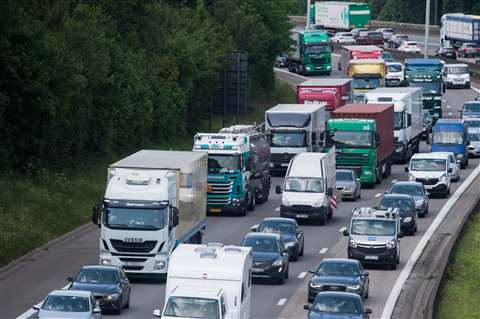EU proposes tougher heavy-duty CO2 limits
15 February 2023
The European Commission has proposed ambitious new CO2 emissions targets for new heavy-duty vehicles (HDVs) from 2030 onwards. The new targets aim to significantly reduce CO2 emissions in the transport sector, where trucks, city buses and long-distance buses are responsible for over 6% of total EU greenhouse gas (GHG) emissions and more than 25% of GHG emissions from road transport.
The commission proposes phasing in stronger CO2 emissions standards for almost all new HDVs with certified CO2 emissions, compared to 2019 levels. The proposal calls for a 45% reduction from 2030, a 65% reduction from 2035 and a 90% reduction from 2040.
 The European Commission has proposed new regulations that would significantly reduce CO2 emissions from heavy-duty trucks and buses. (Photo: European Commission)
The European Commission has proposed new regulations that would significantly reduce CO2 emissions from heavy-duty trucks and buses. (Photo: European Commission)
To stimulate faster deployment of zero-emission buses in cities, the commission also proposed making all new city buses zero-emission as of 2030.
In line with the European Green Deal and REPowerEU objectives, the proposal will also have a positive impact on the energy transition by lowering demand for imported fossil fuels and enhancing energy savings and efficiencies in the EU’s transport sector. The commission said it will provide benefits for European transport operators and users by reducing fuel costs and total cost of ownership and ensure a wider deployment of more energy-efficient vehicles.
VDMA, the Frankfurt, Germany-based association of machinery and equipment manufacturers, noted that the proposal provides for a significant tightening of the previous CO₂ fleet limits, but leaves the door open in principle for internal combustion engines. “It is right to revise the CO₂ standards for heavy-duty vehicles in line with the ‘Fit for 55’ targets,” said Hartmut Rauen, VDMA’s deputy managing director. “In the case of trucks, the EU Commission has avoided the mistake it made in regulating passenger car powertrains. The narrow ban on thinking and combustion engines has now given way to a more open space for technology and innovation. We welcome this.”
In addition, the commission said the revised standards provide a clear and long-term signal to guide EU industry investments in zero-emission technologies and boost the rollout of recharging and refuelling infrastructure.
The vast majority (99%) of heavy-duty vehicles in the EU fleet currently run on internal combustion engines, fueled largely by fossil fuels such as diesel. Current HDV emissions standards date from 2019 but are no longer in line with the EU’s climate objectives, the commission said.
VDMA criticized the commission’s exclusion of synthetic “eFuels,” low- and zero-carbon liquid fuels that can be used in existing combustion engines and can be distributed through existing commercial fuel infrastructures. “To defossilize the transport sector, all promising technologies must be used,” said Peter Müller-Baum, managing director of VDMA’s Power-to-X for Applications program. “Renewable fuels are definitely one of them. It is incomprehensible that the EU Commission wants to do without the contribution of eFuels.”
The commission said that investments need to be channeled into zero-emission vehicles and into the recharging and refueling infrastructure and it has already proposed an Alternative Fuels Infrastructure Regulation to develop the necessary charging infrastructure to support the heavy-duty vehicle sector. The regulation calls for the installation of charging and fueling points at regular intervals on major highways – every 60 km for electric charging and every 150 km for hydrogen refueling. The commission said it is working with co-legislators to finalize the negotiations on the proposals.
STAY CONNECTED




Receive the information you need when you need it through our world-leading magazines, newsletters and daily briefings.
POWER SOURCING GUIDE
The trusted reference and buyer’s guide for 83 years
The original “desktop search engine,” guiding nearly 10,000 users in more than 90 countries it is the primary reference for specifications and details on all the components that go into engine systems.
Visit Now
CONNECT WITH THE TEAM









